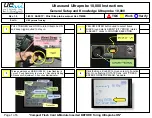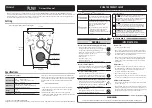
TopClean S CPC 30
7 Maintenance
Hauser
93
The selection of cleaning agent depends on the type of soiling. The most frequent
soiling and the associated cleaning agents are listed in the table below:
!
Note!
•
Only clean redox electrodes mechanically. Chemical cleaning applies a potential to
the electrode that takes several hours to decay. This potential causes measuring
errors.
•
Do not clean IsFET sensors with compressed air.
7.2.2
Inspecting the sensor
Check for air bubbles in the pH electrode:
Air bubbles indicate incorrect installation. Therefore check the installation position:
•
Permitted: 15° to 165° to the horizontal.
•
Horizontal installation or installation with the plug-in head pointing downward are not
permitted (except when using a CPS 401 IsFET pH sensor).
Check for reference system reduction:
The inner metal lead of the reference system (Ag/AgCl) of a combination electrode or a
separate reference electrode is usually light-brown and matt. A silver-coloured
reference system is reduced and therefore defective. The cause is a current flowing
through the reference element.
Possible causes:
•
Incorrect operating mode of the measuring instrument (PML pin connected, but still
unsymmetrical operating mode ("without PML") selected. See description of functions,
Field A6 on p. 23.
•
Shunt in measuring cable (e.g. due to humidity) between reference line and grounded
screen or PA line.
•
Measuring instrument defective (shunt in reference input or entire input amplifier
downstream of PE).
Type of soiling
Cleaning agent
"
Caution!
Danger of sensor destruction. No acetone may be used to clean an IsFET pH sensor (CPS 401), otherwise
the material may be damaged.
Greases and oils
Substances containing tensides (alkaline) or water-
soluble organic solvents (e.g. alcohol)
#
Warning!
Danger of caustic burns! Protect your hands, eyes and clothing when you use the following cleaning
agents.
Calciferous deposits, metal hydroxide deposits,
heavy biological deposits
3% HCl
Sulphide deposits
Mixture of hydrochloric acid (3%) and
thiocarbamide (commercially available)
Protein deposits
Mixture of hydrochloric acid (0.1 molar) and
pepsin (commercially available)
Fibres, suspended substances
Water under pressure, poss. with surface-active
agents
Light biological deposits
Water under pressure
















































